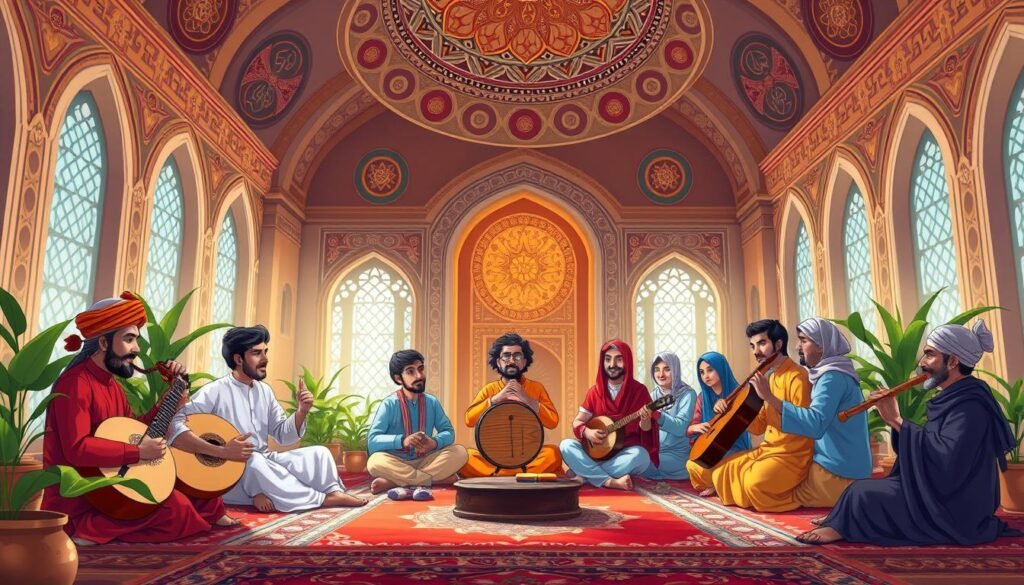Can listening to music during Ramadan really be a distraction? This sacred month is all about reflection and devotion. The question of whether Muslims can listen to music is a big debate.
In many Islamic cultures, music is very important. But, its role during Ramadan is not clear-cut. Let’s look into the Ramadan music rules and how they affect different beliefs.
Some think music is a distraction. Others see it as a way to deepen spiritual experiences. We’ll also look at what Islamic teachings say about music. This will give us a better understanding of the issue.
Let’s explore this complex topic together. We’ll find out what different Muslims believe about fasting and music during Ramadan.
Understanding Ramadan: A Sacred Month in Islam
Ramadan is more than just fasting. It’s a time for deep spiritual thinking, more devotion, and coming together as a community. Over 1.6 billion Muslims worldwide celebrate this month. It starts when they see the crescent moon in the sky.
Fasting in Ramadan means not eating or drinking from dawn to dusk. It also means no sex, smoking, or other fun activities. This helps Muslims control themselves and grow closer to their faith.
For 29 to 30 days, Muslims pray together at night. They read parts of the Holy Qur’an. This strengthens their connection with Allah and brings people closer together.
The Role of Music in Islamic Culture
Music has been a key part of Islamic culture for ages. It connects people across generations and builds strong bonds. The impact of music on spirituality is huge, helping people feel closer to their faith.
In Sufism, a mystical part of Islam, music is seen as a way to reach higher spiritual levels. It uses rhythmic chants and melodies to make worship more meaningful.
In places like the Middle East, Africa, and South Asia, music in Islam is seen differently. Some groups use music in weddings and religious events. This shows how faith and culture can mix together.
Experts say music helps people come together and feel a strong connection to their beliefs. It’s a powerful tool in Islamic culture.

There’s a big debate about music’s role in Islam. Can it really uplift and inspire, like during Ramadan? When people pray, the thoughts on music’s place become very important.
Things like intention, where you are, and who you’re with matter a lot. Music’s role in Islamic culture is complex but very important. It helps us understand and value its deep meaning in different communities.
Can Muslims Listen To Music During Ramadan
There’s a big debate in the Muslim community about music during Ramadan. Different groups have their own perspectives on music in Ramadan. Some say music distracts from prayer and reflection, which are key during this time.
Others think it’s okay to listen to music quietly. They believe it can fit with the spirit of Ramadan.
Different Perspectives Within the Muslim Community
How people see music and fasting shows what they think about Islamic teachings. Some scholars think music takes away from fasting’s spiritual benefits. Others say it’s okay if the music doesn’t lead to bad thoughts or actions.
It’s important to know about these different views. They help us understand the many Islamic opinions on music in Ramadan.
Interpretations of Quranic Teachings
The Quran doesn’t directly say no to music. This leads some to think it’s okay under certain conditions. But, traditional views say listening to music might lessen the fasting’s spiritual gains.
This shows how important personal actions and intentions are. It lets people follow Ramadan in their own way, based on their understanding of Islamic texts.
Islamic Teachings on Music: Quran and Hadith
Islamic teachings on music come from the Quran teachings on music and the Hadith. The Hadith shares the Prophet Muhammad’s (PBUH) actions and words. Yet, opinions on music vary among scholars and followers.
Some Islamic scholars believe music is not forbidden. They look at texts that talk about context. They say some music might be okay, like traditional instruments during Ramadan.
Listening to music privately might be okay for some. It lets people enjoy music without disturbing others. But, during Ramadan, it’s hard to balance personal joy with spiritual duties.
People following Islam face many opinions on music. Some see it as a distraction, while others find comfort in it. This shows the complex views on music in Muslim life today.
Debates Around Music During Ramadan
Discussions about music during Ramadan show a wide range of opinions in the Islamic world. Scholars have different views on music during Ramadan. These views show how culture and religion mix together.
Contrasting Views Among Islamic Scholars
Islamic scholars have different opinions on music during Ramadan. Some say music is a distraction and hinders spiritual growth. They believe we should focus more on worship and self-reflection.
Others think that music can help us feel closer to God if it’s positive. This leads to interesting talks in mosques and community centers.
The Influence of Cultural Practices
Culture plays a big role in how Muslims view music during Ramadan. In some cultures, music is a big part of Iftar gatherings. But in others, music is avoided during Ramadan.
This shows how culture affects our understanding of religious practices. It’s a complex mix of culture and religion.
Types of Music Accepted in Ramadan
As Ramadan gets closer, we talk more about music that’s okay to listen to. Different groups have their own views on music, based on their culture and faith. Devotional music is often seen as a good choice because it helps people connect with their faith.
Traditional instruments like the tambourine and daf are often liked. They help bring people together during Ramadan. But, opinions on music vary a lot. Some people stick to old ways, while others are more open to new sounds.
Even though some think music is not allowed, many people have mixed feelings. Listening to music that’s okay can be a way to honor your faith and enjoy culture. It’s important to think about how music can deepen our spiritual connection during Ramadan.

Spiritual Goals During Ramadan and Music’s Impact
Ramadan is a special time for spiritual growth and deep thinking. People focus more on their faith and self-improvement. The role of music in this month is a topic of interest.
Some think music can make spiritual experiences better. Others worry it might ruin the quiet needed for prayer and thinking.
The Focus of Worship and Reflection
During Ramadan, we need a good environment for worship and thinking. Music can help or get in the way. For some, it creates a calm state for prayer.
But, not everyone agrees. Some music might take our minds off Ramadan’s goals. It shows music’s impact can vary greatly.
Potential Distractions from Spiritual Growth
Many things can distract us in Ramadan, and music is one concern. Music with catchy or emotional songs might pull us away from our spiritual goals. It’s important to know how music affects us.
We need to decide if music fits with our spiritual path. This choice helps us stay focused on Ramadan’s true purpose.
Finding Balance: Music and Worship in Ramadan
Exploring Ramadan’s many sides, finding a balance between music and spirituality is key. It’s important to remember that music choices are personal. This balance is not just about avoiding loud music. It’s also about blending music in Islamic worship with deep reflection and prayer.
Families often change their fun activities during Ramadan. They focus on spiritual growth but also enjoy moments together. Enjoying music after Iftar or in uplifting activities adds to the Ramadan experience. This mix of fun and worship strengthens community bonds and respects observance.
Having open talks in our communities helps us deal with different views on music in Ramadan. Adding sound to our spiritual practices can make the month more joyful. It helps us see how our music choices enrich our faith.
FAQ
Can Muslims listen to any type of music during Ramadan?
What are the main points of contention regarding music in Ramadan?
How can music enhance spiritual experiences during Ramadan?
Are there specific types of music that are more accepted during Ramadan?
What do Islamic teachings say about the relationship between music and spirituality?
How do cultural backgrounds influence perspectives on music in Ramadan?

Embracing Faith, One Insight at a Time!
The teachings of the Quran have always guided my path. With a deep passion for Islamic knowledge, I strive to blend the wisdom of tradition with the relevance of today, making the timeless messages of Islam accessible and meaningful for everyone.
Muslim Culture Hub is my platform to share historical insights and thought-provoking articles, exploring both well-known and lesser-discussed aspects of Islamic culture and beliefs. My mission is to create an inclusive online space where everyone can learn, strengthen their faith, and connect with the profound message of Islam.
Join the journey!
May peace be upon you.








